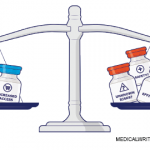Varenicline (Chantix) Use Continues to Be Worrisome
The Food and Drug Administration (FDA) continues to monitor the use of the smoking cessation drug, varenicline (Chantix). It had prior label changes related to its potential safety, particularly related to neuropsychiatric side effects (e.g., suicidal ideation and behavior). The new label change is related to its interaction with alcohol.2 Until a potential patient knows how varenicline may affect their alcohol tolerance, individuals should decrease their alcohol consumption.
Patients have also developed seizures (n=64) while taking varenicline. Patients who developed seizures usually did so within the first month of starting varenicline and had no prior seizure history (n=37) or had seizures that were not well controlled. Twenty-seven patients had a history of controlled seizures that changed while on varenicline.
This new seizure information has been added to the Warnings and Precautions sections of the label and the Medication Guide. Patients who develop seizures while taking varenicline should stop taking it and immediately seek medical attention.
Additionally, a review of adverse drug event data from Pfizer and the FDA identified cases of alcohol intolerance, increased drunkenness, unusual or aggressive behavior and amnesia. The Warnings and Precautions sections and the Medication Guide have also been updated with information derived from Pfizer-conducted analyses of randomized controlled trial data and observational studies evaluating neuropsychiatric side effects, which did not seem to be increased by varenicline.
Pfizer is conducting a large varenicline clinical safety trial investigating neuropsychiatric risks. Results are expected later this year. For patients who are currently taking varenicline, advise them to immediately stop taking it if they develop agitation, hostility, aggressive behavior, depressed mood or changes in behavior or thinking that are different for them or if they develop suicidal behaviors. In addition, before prescribing varenicline, the potential risk vs. benefit of potential seizures should be determined in patients with a history of seizures, or have other factors that can lower the seizure threshold, such as concomitant medications (e.g., bupropion, antidepressants) or other factors.
Please remember to report any adverse drug reactions to the FDA MedWatch Program.
Michele B. Kaufman, PharmD, CGP, RPh, is a freelance medical writer based in New York City and a pharmacist at New York Presbyterian Lower Manhattan Hospital.
References
1. Eli Lilly and Co. Press Release. Lilly’s ixekizumab met primary endpoint in a Phase 3 study investigating the treatment of psoriatic arthritis. April 20, 2015.
2. FDA Drug Safety Communication: FDA updates label for stop smoking drug Chantix (varenicline) to include potential alcohol interaction, rare risk of seizures, and studies of side effects on mood, behavior, or thinking. March 9, 2015.



